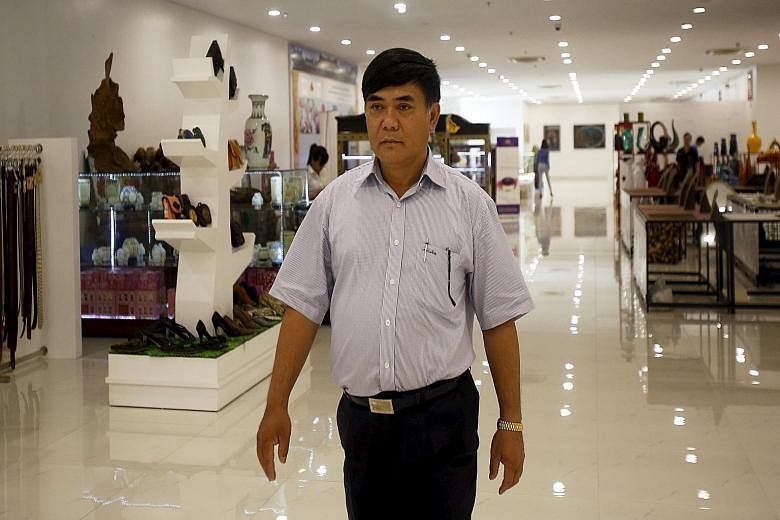HANOI • Soldier-turned-tycoon Nguyen Huu Duong is a fierce patriot still fighting to protect his country, four decades after battling US forces in the Vietnam War.
The construction mogul has amassed a war chest of tens of millions of dollars to fight for greater independence for Vietnam's economy and counter an invasion of a different kind: Chinese goods.
Rapid growth in Vietnam is masking a chronically ill small-business sector that Mr Duong said is suffocated by a multibillion-dollar influx of cheap, mass-produced goods from China, undercutting domestically produced items.
Mr Duong, a rags-to-riches entrepreneur, has a rescue plan which he said is not a swipe at China, but a nurturing of start-ups, enticing them with free 50-year leases in his Hanoi mall "V+" - if they sell only Vietnamese-made products.
He is lobbying the government to introduce the model nationwide to stem the closures of tens of thousands of businesses each year and encourage customers to go local.
"China exports to the world at very, very low prices and that's put huge pressure on the Vietnamese economy and production," Mr Duong said. "I'm a businessman, I understand why firms can't develop. Without this kind of thing, Vietnamese businesses will perish."
Vietnam's dependence on its giant neighbour and biggest trade partner is resented by a population embittered by a history of perceived bullying and territorial incursions.
Three-quarters of their annual US$60 billion (S$84.5 billion) trade are made up of imports from China and many experts consider that understated. That flow barely registers in China, worth just 0.65 per cent of its US$2.3 trillion in exports last year.
The yuan devaluation has triggered domestic fears of China flooding Vietnam with even cheaper goods, forcing its central bank to go on the defensive by devaluing its dong currency and widen its trading band twice in six days.
Former rickshaw driver Duong, 61, knows hard times. Having prospered from his Hoa Binh brewery and construction empire, he has vowed to spend half of his fortune helping Vietnam build a small-business bedrock.
Dubbed "Duong Beer", he said that he spent US$27 million (S$38 million) on the V+ mall, which opened in February. It reduces overheads to slash prices and sells everything from handbags and shoes to nuts and ornaments.
Its supermarket undercuts foreign rivals like Big C and the first V+ shop has just opened on a Hanoi street, selling baguettes with omelettes and pate. "Prices are good, quality is good. This must be one of the cheapest places in South-east Asia," said Mr Duong.
Mr Doan Duy Khuong, vice-president of the Vietnam Chamber of Commerce and Industry, said the trade imbalance "plagued policymakers and businesses" and stifled domestic competition.
Mr Dominic Mellor, an economist at the Asian Development Bank, said the V+ concept showed good intentions but the government should educate firms and nurture those in its most competitive sectors.
"There needs to be a change in mindsets and reassessment of the government's role, with targeted business development support," he said. "It needs to move away from blanket subsidies towards targeted subsidies for industries and businesses able to compete and integrate into the global value chain."
On a macro level, Vietnam is manoeuvring to wean its economy off China, cosying up to Japan, South Korea, Europe and the United States and chasing free trade accords with more than 60 markets, including a Trans-Pacific Partnership covering a third of global trade.
REUTERS

